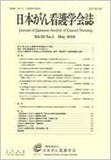Japanese
English
- 販売していません
- Abstract 文献概要
- 参考文献 Reference
要旨
続発性リンパ浮腫は,いつ症状が出るかわからない.また,出現した症状にも個人差が大きい.患者自らが患者にしかわからない微細な変化に気づけるかどうかが大切である.そこで,本研究では,がん術後の続発性リンパ浮腫をもつ患者による症状の気づき(awareness)に関する概念を明らかにすることを目的とした.看護学,医学,社会学,心理学の領域から抽出した文献と関連書籍の20資料を分析対象とし,Walker & Avantの手法を参考に分析を行った.
分析の結果,がん術後の続発性リンパ浮腫をもつ患者による症状の気づきの属性は,「自己への注目」「違和感」「普段の状態からの変化」「関心の高さ」「危機感」であった.以上に基づき,がん術後の続発性リンパ浮腫をもつ患者による症状の気づきとは,「リンパ浮腫の発症のリスクへの危機感やこのような自分への関心をもつことで,自分に注目し,違和感や普段の状態からの変化といった感覚をもつというリンパ浮腫の症状や徴候に対して主観的に感知する概念で,リンパ浮腫に関する知識や経験,生活への支障,症状の辛さ,がん治療後の身体の捉え方に影響を受ける」と定義された.
本概念は,セルフモニタリングといった症状をマネジメントしていく概念に包括され,セルフモニタリングにおける対処や管理の対象である症状を認知するために必要な概念である.そのため,症状の早期発見においては,重要な概念であり,より具体的で効果的な援助を考える基本となるといえる.
In this study, we aimed to describe the concept of awareness of patients with secondary lymphedema developing after undergoing surgery for cancer. We analyzed a total of 20 materials: literature selected from the fields of nursing science, medicine, sociology, and psychology, as well as relevant publications, using methods suggested by Walker and Avant. The analyses revealed that the subjects' self-awareness had covered “focusing on self”, “discomfort”, “differences from normal”, “interest”, and “fear”. Based on these findings, we defined the awareness of patients with secondary lymphedema developing after undergoing surgery for cancer as a “sense in which such individuals show reactions to symptoms/signs of lymphedema or perceive some changes; specifically, feeling discomfort or differences from normal, through objectively focusing on themselves as those who have a risk of lymphedema”. In addition, according to our definition, this cognitive process is influenced by patients' knowledge and experience of lymphedema, the extent to which the disease hinders their lives, symptom severity, and the physical recognition after the cancer treatment. This concept is a part of the general ideas regarding symptom control, such as self-monitoring, and is necessary for recognizing and dealing with problematic symptoms. Thus, the concept is important for the early detection of symptoms, and will become a basis for providing thorough and effective support to prevent lymphedema.
Copyright © 2016, Japanese Society of Cancer Nursing All rights reserved.


